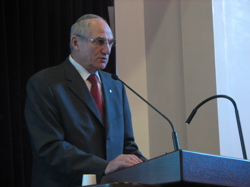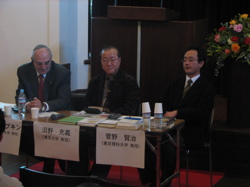Center for Interdisciplinary Study of Monotheistic Religions(CISMOR)Doshisha University
> Public Lectures > “The Emergence of the Godless Jew: Russia and Beyond”Public Lectures
Lecture (Open for the public)
“The Emergence of the Godless Jew: Russia and Beyond”
| Date: |
2008/12/02 13:10-16:15 |
|---|---|
| Place: | Clark Chapel, Clark Memorial Hall, Imadegawa Campus, Doshisha Univ. |
| Lecture: | Prof. Yakov Rabkin (Université de Montréal) |
| Summary: | |
|
In this lecture, Dr. Yakov Rabkin surveyed Jewish history since the Second Temple Period focusing on the construction of Jewish identity, and clarified how the new identity of 'Jew as atheist' originated in the Russian Empire. According to Rabbinic Judaism, the Jewish community (Umma) is solely based on the Torah and its teaching. This identity has been of great significance after the Diaspora. It released Judaism from geographical definitions (land or Temple) and made it a portable religion. And, renouncing any political ambition for reasons solely based on the Torah and its teachings, Jews could construct good relations with the political powers controlling their settlements. In the Christian world of Europe, Jews have been persecuted for a long time. This situation changed when the Enlightenment was on the rise during the 18th and 19th centuries. Influenced by the Enlightenment’s advocacy of universal humanity and equality with no regard to differences of faith, Jews were granted citizenship equal to other people. On the other hand, the Enlightenment brought about secularization, which gave rise to the liberal stream in Judaism (Reform Judaism). With the enthronement of Enlightened despotism in Catherine II, this liberal stream spread throughout the Russian Empire and produced estrangement from Judaism among many Jews. In the Russian Empire-different from Germany or France-most Jews were obliged to live in serfdom in limited area. Consequently, there were tensions and conflicts between Orthodox and Reform Judaism and between pious and secular Jews in the Jewish living areas. Eventually the latter refused religious elements and found their identity in nation or ethnicity, language (Yiddish), and land (the living area of Jews). In fact, the birth of the 'Jew as atheist' was deeply connected to national identity. These atheistic Jews became bearers of Zionism beginning at the end of the 19th century. When the Russian emperor Alexander II Nikolaevich was assassinated and pogroms were opportunistically extended all over the land, there arose a tendency among Jews to conceive of a Jewish nation-state in the 'Promised Land.' This movement developed under the leadership of many atheistic Jews, who wanted to acquire Jewish native lands in order to nurture their own culture. In the Soviet Union of the 1920s and 30s there was oppression against religions and distress continued after World War II. As a result, atheistic Jews conceived of one place that might preserve and allow the development of their culture without the considerable difficulties faced in Diaspora-namely, Israel. However, the realization of this dream caused a new conflict just like the earlier one within Jewish living areas of the Russian Empire, that is, the conflict between Orthodox Judaism and atheistic Jewry. In Israel even today, this confrontation shows no sign of being solved. Kiyoshi Uehara (CISMOR Promoted Reseacher, Graduate Student, School of Theology, Doshisha University) |
|
|
Handout |
|

